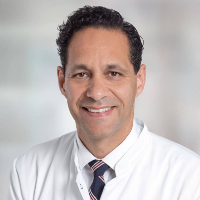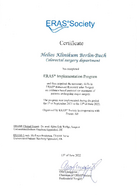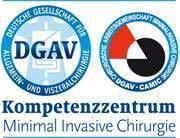Liver Cancer — Atypical Marginal or Wedge Liver Resection: treatment in the Best Hospitals of Germany
Treatment prices are regulated by national law of the corresponding countries, but can also include additional hospital coefficients. In order to receive the individual cost calculation, please send us the request and medical records.

Department of General, Abdominal Surgery and Surgical Oncology
The Department of General, Abdominal Surgery and Surgical Oncology offers the full range of services in these medical fields. Whenever possible, operations are performed using minimally invasive techniques, which are the gold standard of modern surgery. The outstanding quality of medical care is confirmed by numerous prestigious certificates, including certificates from the German Cancer Society, the German Hernia Society, etc. In addition, the department provides innovative hyperthermic intraperitoneal chemotherapy (HIPEC), which is available only in the most progressive clinics in Europe.







Department of General and Abdominal Surgery, Colorectal Surgery, Hepatopancreatobiliary Surgery, Hernia Surgery and Bariatric Surgery
The Department of General and Abdominal Surgery, Colorectal Surgery, Hepatopancreatobiliary Surgery, Hernia Surgery and Bariatric Surgery provides the full range of surgical treatment in its field of competence. The department's highly qualified surgeons annually perform about 2,000 surgical interventions. Extensive clinical experience allows the specialists to perform even particularly complex operations. The department’s advanced operating rooms serve for surgery to treat gastrointestinal diseases, liver, gallbladder, bile duct, pancreatic, rectal, anal and colon pathologies. The medical facility also successfully performs operations to treat hernias: inguinal, umbilical, and anterior abdominal wall hernias. In addition, the department's doctors deal with the surgical treatment of morbid obesity. Minor traumatic laparoscopic interventions are considered the gold standard, which guarantee a patient minimal risks and rapid postoperative restoration. Surgeons tell the patient in detail about their upcoming treatment and, in every possible way, support them in their recovery.







Department of General and Abdominal Surgery, Colorectal Surgery, Endocrine Surgery and Hernia Surgery
The Department of General and Abdominal Surgery, Colorectal Surgery, Endocrine Surgery and Hernia Surgery offers the full range of modern surgical interventions in the areas of its specialization. Every year, the medical facility performs more than 2,500 surgical interventions on an inpatient and outpatient basis. The department has vast clinical experience in the field of minimally invasive surgery, which allows the patient to avoid severe pain and prolonged hospitalization. In addition, the department offers robotic surgery using the most modern models of the da Vinci surgical system. The medical facility has the status of the Reference Center for Minimally Invasive Surgery and Hernia Surgery. Surgical treatment of cancer is one of the department's clinical priority focuses. A large number of da Vinci robot-assisted interventions are performed here for gastrointestinal cancers. The department holds a leading position in the use of the da Vinci surgical system in the treatment of rectal and sigmoid cancer patients. The operating rooms of the medical facility are equipped with the very latest technology, while hygiene and safety standards are at the highest level as well. Prior to surgery, the patient undergoes a comprehensive examination. Doctors also assess the risks of the upcoming operation and its expected results. With appropriate clinical indications, preference is always given to minimally invasive surgery.






Liver cancer is the fifth most common type of cancer in the world, but the third most common cause of death from oncological diseases. About one million new cases of this disease are diagnosed each year. From 10 to 30% of patients are candidates for surgical treatment, which offers the best results of all techniques: five-year survival rates of up to 70%.
Surgery is more common in developed countries (up to 30% of patients) compared to countries with a low level of medicine. Surgical techniques are constantly improving, and the indications for the surgical treatment of liver cancer are expanding. Today, surgeons perform operations even on patients with large tumors, portal hypertension, thrombosis of the portal vein branches, and low functional reserve of the liver.
If you want to undergo your surgical treatment for liver cancer, you should go to Germany because operations for this disease are technically complex and unsafe. New technologies are available abroad to make treatment more effective and less traumatic, thereby reducing the risk of complications and shortening the rehabilitation period.
Content
- What is an atypical resection?
- Laparoscopic liver surgery in Germany
- Robot-assisted partial hepatectomy in Germany
- AR navigation (augmented reality)
- Intraoperative fluorescence diagnosis
- Where can I have liver resection surgery?
What is an atypical resection?
Liver resection surgery can be typical (anatomic) or atypical. In the first case, a specific structural unit of the liver is removed, such as a lobe, a segment, or several segments. When performing an atypical resection, doctors remove a part of the liver without paying attention to its structure. This approach can be used when more functioning parenchyma needs to be preserved in patients with low functional reserve in order to reduce the risk of liver failure.
There are several types of this operation, depending on how and where doctors cut through the liver parenchyma. Atypical marginal liver resection and hepatic wedge resection are more common surgical procedures. Planar or transverse resections are less common.
Laparoscopic liver surgery in Germany
The standard approach to partial liver resection is to perform the operation through an open approach (laparotomy), that is, a large abdominal incision. However, specialized centers are increasingly performing wedge resection for liver cancer and other types of surgery using minimally invasive techniques.
Initially, laparoscopic liver resection was subject to skepticism due to concerns about the adequacy of the resection margins and the possibility of reducing the traumatic nature of the surgical intervention. Surgeons have encountered some technical problems, especially in the management of bleeding during laparoscopic procedures.
Nowadays, however, these limitations have been overcome. It has been proven (Andreas Andreou et.al.) that open surgery does not differ from laparoscopic liver resection surgery in terms of patient survival rates. A large prospective study (El-Gendi et al.) showed shorter operative time and shorter hospital stays for patients undergoing laparoscopy without compromising oncologic outcomes compared to an open surgical approach. Other studies reported less postoperative pain (Young-In Yoon) and a lower risk of infectious complications (Xiao-Bo Wang) as a result of laparoscopy.
Robot-assisted partial hepatectomy in Germany
The top German clinics have a robotic surgical system at their disposal. The robot offers benefits such as increased precision and minimal strain on the abdominal wall. With the introduction of robotic technology, the indications for minimally invasive surgery are expanding. The inconvenient location of tumors is no longer a problem because flexible robotic arms have overcome the limitations of instrument mobility typical of laparoscopic surgery. Therefore, compared to laparoscopy, robotic surgery has a lower risk of converting minimally invasive surgery into open one.
Robot-assisted surgery is therefore better and safer. This option is less traumatic and should be chosen when robot-assisted cancerous liver tumor removal is technically possible. At the same time, the liver resection surgery cost using a robotic surgical system is higher compared to standard surgical procedures.
AR navigation (augmented reality)
Innovative technologies are used for surgical liver cancer treatment in Germany. More and more centers are implementing AR navigation. This is the creation and real-time use of a virtual 3D model of the liver.
The organ has a complex structure and contains many blood vessels and bile ducts, while 3D imaging enables the doctor to have a deeper perception. This technology is not just about convenience for the surgeon. Studies have shown that AR navigation provides real clinical benefits: less blood loss, shorter hospital stays, and faster postoperative recovery (Weiqi Zhang).
Intraoperative fluorescence diagnosis
The injection of a dye that makes cancer cells glow helps doctors detect additional tumors in the liver so that they can expand the scope of surgery if necessary. German surgeons are already implementing this method in the best cancer hospitals. In addition to detecting tumors, it also allows for the detection of bile ducts, the damage to which causes complications.
AR navigation and fluorescence diagnosis can be used in combination. These techniques can overcome the difficulties in cancerous liver tumor removals with complex locations, such as those in the central part of the liver. Bleeding and bile leakage are more common when such tumors are removed.
Moreover, complex operations have a higher rate of conversion from minimally invasive to open surgery. According to the results of one study, patients who underwent standard surgery to remove a hard-to-reach tumor had to convert to laparotomy (open surgery) in 61.8% of cases, while the conversion rate decreased to 35.7% when 3D imaging and fluorescence diagnostics were used (Wen Zhu).
Where can I have liver resection surgery?
If you need surgical treatment for liver cancer, you can get it in Germany. Here you will get the best results with a low risk of complications. You are welcome to visit the Booking Health website to find out the average cost of treatment in Germany, choose a hospital, and schedule your treatment appointment. We will be happy to help you find a cancer center and organize your trip.
Authors:
The article was edited by medical experts, board certified doctors Dr. Nadezhda Ivanisova and Dr. Vadim Zhiliuk. For the treatment of the conditions referred to in the article, you must consult a doctor; the information in the article is not intended for self-medication!
Our editorial policy, which details our commitment to accuracy and transparency, is available here. Click this link to review our policies.
Sources:

